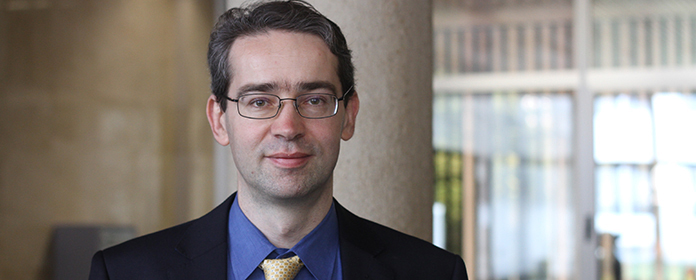Is it possible to reach political agreements?
"When people believe that any concession whatsoever is an ideological defeat, it is impossible to reach an agreement," as David Thunder, a research fellow within the Religion and Civil Society project of the Institute of Culture and Society, claimed

“Agreement,” “coalition,” “dialogue,” “opposition...” These words have resonated in Spanish politics since December 2015. It seems impossible for the parties to reach an agreement, even though their respective political programs share objectives oriented toward the common good, i.e., improving the economy, reducing unemployment, eradicating corruption, etc.
What is blocking dialogue between politicians? According to David Thunder, a research fellow within the Religion and Civil Society project of the Institute for Culture and Society, extreme partisanship is a large part of the answer to this question.
"In Spain, there is a sort of tribalism in politics, that is, seeing opponents as incapable of perceiving the truth, believing they are blind and only you and your tribe can enlighten the people and bring about truth and justice," Thunder noted. He further argues that this tendency can only be overcome by having an open mind since one can in fact learn from the opposition.
According to the researcher, in Spain, a culture of dialogue does not exist. Until the December 2015 elections, the governing parties had no real opposition since they had majorities in Parliament and "did not feel obliged to talk to their opponents." This has led to a split mentality: either one suffers a defeat and is excluded from power or one’s own ideology triumphs. "When people believe that any concession whatsoever is an ideological defeat, it is impossible to reach an agreement," the expert regretted.
Imperfect agreements: The lesser evilFor Thunder, it is possible to reach an agreement in politics even if the parties involved do not completely agree with one another. He points toward reaching middle ground or an imperfect agreement. "The alternative of politics is civil war, which is why one might be willing to accept agreements that are not ideal," he adds and maintains that a non-ideal result is not always a defeat of principles because, for example, justice is not always perfectly implemented.
For the expert, we need the virtue of moderation to accept imperfect agreements. "We are not a perfect society and never will be,” he argued, “we must accept imperfection as a sine quae non for responsible participation in politics."
When the result of an agreement does not perfectly conform to the ideals of any one party, it is seen as a lesser evil. It is accepted to advance or to avoid a worse situation. However, Thunder warns that allowing the lesser evil to "dominate" to avoid a greater evil has its consequences: "Social progress comes to a halt because of a lack of coherent principles that motivate policies."
According to the expert, there are two types of disagreement. First, there are technical disagreements "about the most effective technique for reaching an agreed upon end, for example, increasing the GDP." For Thunder, compromise is herein possible.
The other disagreement is on basic principles, such as how much power the government should have. "This kind of disagreement can be ameliorated, but it cannot be eliminated without a philosophical conversion since it is based on a moral disagreement," Thunder noted.
"It is irresponsible to be inflexible"Thunder warned that being inflexible is irresponsible and especially criticized those who remain set on utopian positions, which amount to "wanting to achieve perfection through imposition." However, he admits that there are situations in which it is possible to maintain a firm opinion, that is, for a greater good. An example is unwavering support for racial equality.
As an example, the expert applauded Martin Luther King Jr, noting that he knew how to remain inflexible, but act with moderation. He first exhausted political and administrative channels and, after they didn’t work, he organized peaceful protests.
How do we know when to give in and when not to? According to the researcher, one needs sound judgment moved by the virtues of moderation and humility. "If the ego is not disciplined, politics collapses into a circus," he warned.
Civic formation to advance the common good"If one cannot find a way to enter politics without losing his moral principles, he must find another way to advance the common good," Thunder explained. This starts with work or through participation in civic associations that contribute to building a better society.
Many people renounce politics and politicians saying that they are corrupt and they do not know what can be done to solve this problem. The researcher argues that is possible to avoid this situation through citizen cooperation, as happened in Poland during communism, where cultural groups tried to promote the idea of the common good through theatre.
"For me, civic education is essential and can help society succeed, even when politics or political parties are corrupt," he concluded.
